Study in Singapore
Free Profile
Evaluation
150+ Experienced
Counsellor
5+ Years
Average Experience
95% Visa
Success Rate
Unlimited
Follow Ups
Best
SOP Writers
Explore Courses For Singapore
Looking into Study Abroad Colleges and Universities as an international student can be a challenge, but it’s one you can overcome! From how to look for accredited school to what you should write about on your applications, Our expert counsellors will help you at every step
Study in Singapore Guides & Resources
Study in Singapore: Find Program, Colleges, Costs, Scholarship, Visa details for International Stude
An island state, Singapore is very close to becoming a “Global Schoolhouse” offering world-class universities and a reputation for educational excellence. Singapore offers a variety of educational opportunities in different languages and cultures. It's known for leading in research and innovation. Emerging as one of the most popular study abroad destinations, specifically among Asian/Indian students, Singapore has 34 universities, out of which six are national universities.
Aspirants who wish to study in Singapore look forward to pursuing education at national higher education institutions. The NUS (the oldest university in the country) and NTU are the biggest and most well-known universities. They rank at #9 and #26 in the QS World University Rankings 2024. Apart from these public universities in Singapore, there is a large pool of autonomous universities and foreign campuses offering a wide range and choices of courses in Singapore for Indian students.;
What attracts international students to Singapore is that the country has outpaced most other Asian countries in offering world-class education. It is also often recognized among one of the safest study destinations with low crime rates. Irrespective of the current economic downturn, Singapore has also managed to maintain a low unemployment rate of only 2%. It can be concluded that collectively these aspects along with various others make Singapore one of the most popular Asian countries for international students.
Study in Singapore for Indian Students: Quick Facts
| Visa Approval Rate | 90% |
| Total Institutions | 40+ |
| Average Study Cost | 18,000 to 65,000 SGD (11 to 40 lakhs INR) |
| Minimum TOEFL score | 85 (iBT) |
| Minimum IELTS score | 6.5 |
Top Universities in Singapore for International Students
With two of Singapore’s National Universities boasting among the 30 top universities in the world, choosing where to study in Singapore is not very difficult. With 40+ universities including both national and international universities, you have an abundance of options to choose from.
A range of collaborations with some of the world's leading education providers has brought some of the leading universities to Singapore. Some of these include MIT, Johns Hopkins University, Georgia Technological University of Chicago Graduate School of Business, INSEAD, and the Wharton Business School of the University of Pennsylvania. Some of the top universities in Singapore and their basic tuition fees are discussed below:
| University | Tuition Fee (SGD) | Tuition Fee (INR) |
|---|---|---|
| National University of Singapore | 50,000 | 30 lakhs |
| Nanyang Technological University | 48,000 | 29 lakhs |
| Singapore Management University | 46,000 | 28 lakhs |
| INSEAD | 60,000 | 37 lakhs |
| Singapore Institute of Management | 20,000 | 12 lakhs |
| Amity Global Institute | 25,000 | 15 lakhs |
| James Cook University | 15,000 | 9 lakhs |
| London School Of Business And Finance, Singapore | 20,000 | 12 lakhs |
| Singapore University of Technology and Design | 30,000 | 18 lakhs |
| TUM Asia | 35,000 | 21 lakhs |
| Management Development Institute of Singapore | 20,000 | 12 lakhs |
Why Study in Singapore?
Studying in Singapore offers students a whole bunch of attractive opportunities such as a wide range of courses, top universities, quality education, and high employability. Around 50,000 students study with various universities in Singapore. Here’s why studying in Singapore is one of the most ideal and considerable choices of international aspirants:
- Cost of Study: The tuition fees, cost of living, and other additional costs related to studying abroad are relatively lower when your choice of study destination is Singapore. As compared to other popular study destinations like the USA, Canada, UK, Singapore Universities offers you world-class education at cheaper rates.;
- UG Degrees Cost: 30,000 SGD (18 lakhs INR)
- PG Degrees Cost: 40,000 SGD (24 lakhs INR)
- Safety: Singapore’s no tolerance towards racism and strict law enforcement policies with a politically stable environment offer a student with safer living conditions. It is globally ranked as 6th safest place in the world by World Population Review.;
- English-taught Programs: A number of courses in all universities that are exclusively available in English. Language is not a barrier for an international student looking forward to studying in Singapore.
- International University Hub: There are 16 leading foreign universities with their centers being set-up in Singapore. Along with this, Singaporean Universities offer a variety of student-exchange programs with Australian, UK, and US universities.;
- Employability: Some of the top universities in Singapore enjoy employability ranking among top 50 universities in the world. Additionally, Singapore is rising as the Asian financial hub and its connectivity with other Asian countries brings in a lot of opportunities. Hence, the employability opportunities are in their prime in Singapore.;
- Business Opportunities: Singapore is among the top 20 for employer activity. It's the world’s largest business center with both local and global companies like United Overseas Bank, Flex, DBS Bank, Singapore Airlines, and Singtel. The US News score and rankings given to the business environment of Singapore is given below:
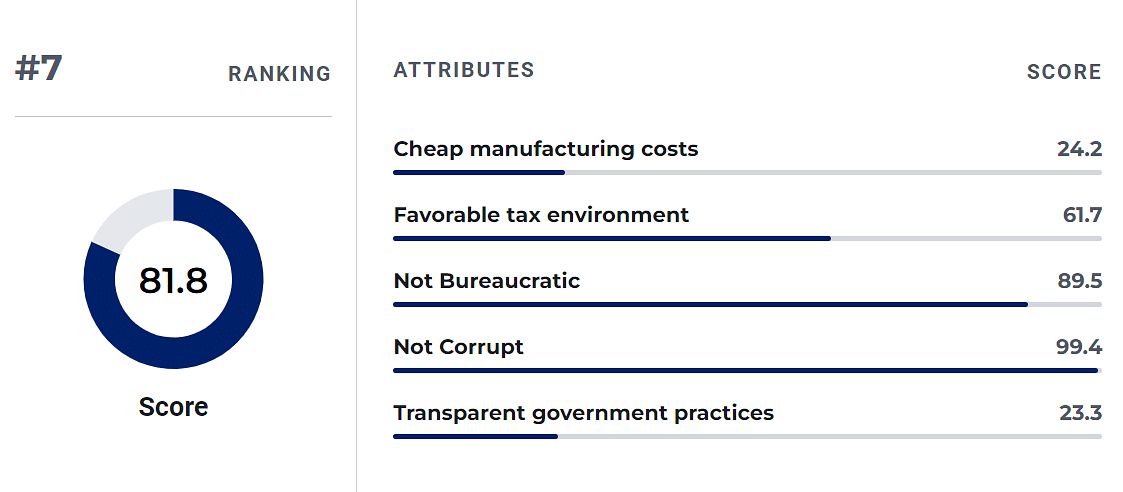
Source: US News and World Report
- Immigration Policies: You get your student visa as soon as you get accepted by a university.
- Funding: There are immense scholarships available for both international and domestic students. The tuition grant by the Singaporean Ministry of Education is one of the most popular grants for which you can apply as soon as you have received your acceptance letter.
Best Courses in Singapore for Indian students
Among some of the most popular courses opted while studying in Singaporean Universities and Polytechnics, certain courses are becoming more and more important. There is a growing need and demand for them among students from Singapore and other international students studying in Singapore. These courses are:
- Cybersecurity
- Media and Animation
- Hospitality and Tourism
- Sports Science and Medicine
- Business Analytics and Digital Economy
- Logistics and Supply Chain Management
- Advanced Manufacturing & Engineering
Study in Singapore: Intake, Enrollment, and Graduates of Universities by Course
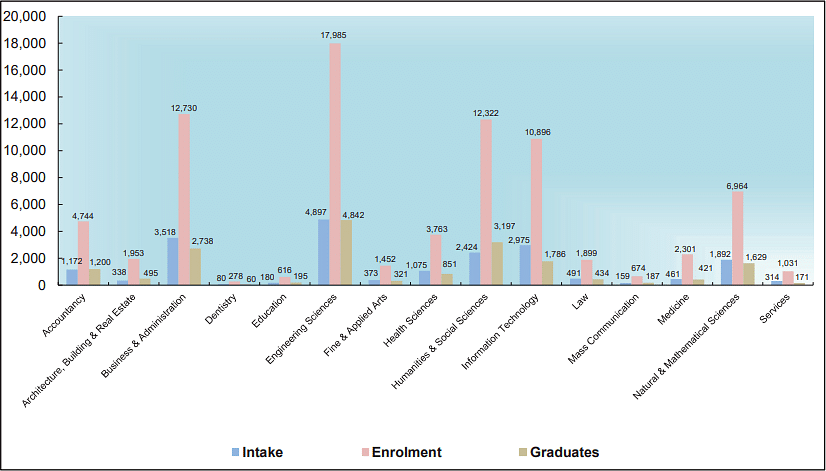
Source: https://www.moe.gov.sg/;
Study in Singapore: Intake, Enrollment, and Graduates of Polytechnics by Course
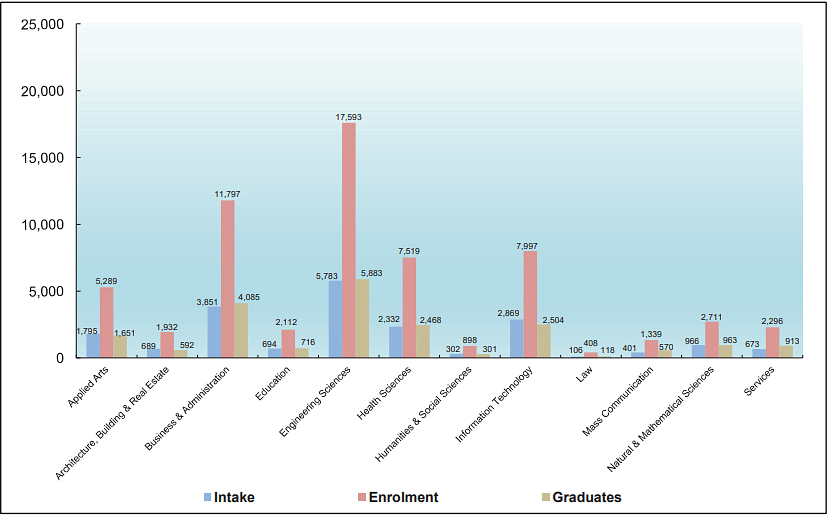
Source: https://www.moe.gov.sg/
Degree Courses to Study in Singapore
- Undergraduate Programs: Bachelor's degrees are usually 3-4 year programs offered by most of the universities in subject areas like business, medicine, engineering, creative arts, and more. You are usually required to have a high school leaving certificate to apply for these programs.;
- Various Certificates and diploma programs in Singapore are also available for undergraduate applicants.
- Postgraduate Programs: Master's degrees are often one-two year programs available as both coursework and research programs. You are usually required to have a relevant bachelor’s degree and English language proficiency to pursue a master's degree in Singapore. There are no additional test requirements to study in Singapore (IELTS/TOEFL) for most of the courses.
- PhD/Doctorate Programs: A number of universities offer Ph.D. programs to international students. Alongside a master's degree, language proficiency test scores (like IELTS/TOEFL, etc), you are required to submit a research proposal which if accepted results in your admission with Singapore Universities.;
- Exchange Programs: Singapore is a hub to many international universities and their center. Several exchange students study in Singapore each year. Some of the popular universities having campuses/centers in Singapore are MIT, Johns Hopkins University, University of Pennsylvania and more.
Read about Popular Programs to Study in Singapore:
Application Cycle to Study in Singapore
Generally, the two Semester system is followed across Singapore universities and institutes. However, some universities observe a Trimester system as well.
- Semester 1 (August Intake)
- The August semester lasts for 18 weeks.;
- The deadline for international students interested in an undergraduate program is March.;
- The deadline for graduate programs extends till Mid November.
- Semester 2 (January Intake)
- January semester is completed within 17 weeks’ time.
- International students can apply till July for the undergraduate program.;
- For graduate applicants, the deadline is in May.;
- Semester 3 (October Intake)
- The deadline for the third-semester undergraduate program is in June.
- The deadline for the postgraduate program is in July.
Study in Singapore: Application Process
Admission to universities in Singapore must be done through the individual universities’ websites. Most public universities in Singapore have two intakes, that is one around August and the other in January. Private universities, on the other hand, have numerous intakes throughout the year.
Searching for the course you want to study in Singapore is the most important step towards making applications with Singaporean universities. With a variety of courses available at your discretion, it is very important to choose the right type. Your choice, of course, would depend upon the following factors:
- You want to do a Diploma, UG, PG, or Ph.D.
- Future employment opportunities for the course you want to choose
- University Ranking, etc
- Zero-in on the course you want to study and start by filling the application form.
- Most universities provide an Application Checklist that you can refer and submit.
- Students will be informed well in advance if they receive an admission offer, so they will have ample time to make other arrangements before the semester begins.
Study in Singapore Requirements
| Where to Apply | University Websites |
| Application Fees | ~100 SGD (6,185 INR) |
| Basic Requirements | Transcripts, standardized test scores |
| Supporting Documents | SOP for Singapore | Resume | Singapore student visa |
| Language Proficiency Requirements | IELTS- 6.5, TOEFL ibt- 85 |
Cost of Studying in Singapore for Indian students
The boosting economy of Singapore is accompanied by some of the highest tuition fees in Asia. Irrespective of the high cost of study in Asia, it is still one of the most in-demand study destinations. This is because when compared to other study abroad destinations, Singapore is rather cheap. Additionally, around 50% of the overall international student population studying in Singapore is awarded grants and funds to support their educational expenses.
Study in Singapore Fees
| Level of Study | Annual Fees (SGD) | Annual Fees (INR) |
|---|---|---|
| UG | 35,000 | 21 lakhs |
| PG | 40,000 | 24 lakhs |
| BBA | 25,000 | 15 lakhs |
| MS | 50,000 | 30 lakhs |
| MBA | 70,000 | 43 lakhs |
| PhD in Singapore | 26,000 | 16 lakhs |
Cost of Living in Singapore
The average cost of living in Singapore is around 15,000 SGD (9.2 lakhs INR) a year. Given below is a detailed bifurcation of various costs involved in studying in Singapore:
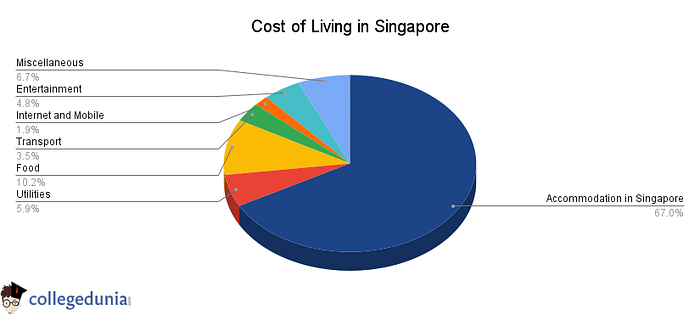
| Expense Type | Monthly Cost (SGD) | Monthly Cost (INR) |
|---|---|---|
| Accommodation in Singapore | 2,500 | 1.54 lakhs |
| Utilities | 220 | 13,600 |
| Food | 380 | 23,500 |
| Transport | 130 | 8,000 |
| Internet and Mobile | 70 | 4,320 |
| Entertainment | 180 | 11,100 |
| Miscellaneous | 250 | 15,400 |
Life in Singapore is a true melting point of cultures, with a mixture of authentic Asian, Asian-fusion, and western worlds. With a booming financial services sector, you can expect to live in one of the Asian Tiger economies with prosperity, scenic beauty, and safety.
Study in Singapore Scholarships
As mentioned earlier, Singapore offers 50% of its international students scholarships to afford their educational expenses. Scholarships in Singapore are usually offered on the basis of academic merit, home country, and other factors. Some of the popular scholarships for international students are:
- Singapore International Graduate Awards: Available for international students with excellent academic records at the undergraduate level, and who are also interested in research work. Offers financial support for up to 4 years of Ph.D. studies including full tuition fees waiver, monthly stipend, settlement allowance, and airfare grant.
- INSEAD-Syngenta MBA Scholarships for Developing Country Leaders: Available for students from an emerging economy pursuing MBA. Offers award money of 32,000 SGD (19 lakhs INR).
- ADB-Japan Scholarship Program for Developing Countries in Asia and Pacific: Offered to international students from ADB borrowing member countries pursuing masters or doctoral programs in a university at Singapore. Waivers full tuition fees, a monthly subsistence and housing allowance, allowance for books, medical insurance, and travel expenses for a period of one year.
- Singapore Government Scholarships for Southeast Asians: Offered to meritorious students from ASEAN countries enrolled in undergraduate programs at a University in Singapore. Awards full tuition fees waiver, a living allowance of 4,300 SGD (2.65 lakhs INR) per annum, and accommodation fee.
- SIA Youth Scholarship: Offered to students from ASEAN countries pursuing their pre-university degrees. SIA Youth Scholarships offer hostel allowance, medical cover expenses, airfare, and school fees.
- NUS Science and Technology Scholarships: Offered to Asian freshmen at NUS, wavering full-tuition, 6,000 SGD (3.71 lakhs INR) for living allowance, and 2,000 SGD (1.23 lakhs INR) one-time allowance. NUS Science and Technology Scholarship is limited in number.
- Tuition Grant by the Ministry of Education: The grant covers complete tuition fees. However, one of the major conditions on this grant is, the graduating student has to sign a bond that they will work in Singapore for three years.
Study in Singapore: Jobs
The typical salary in Singapore is about 70,000 SGD (43 lakhs INR). On average, people working full-time in Singapore earn around 5,783 SGD (3.57 lakhs INR) per month, which adds up to approximately 69,396 SGD (42 lakhs INR) annually.;
Top Recruiters in Singapore
Some of the popular job roles and the salaries offered at those are:
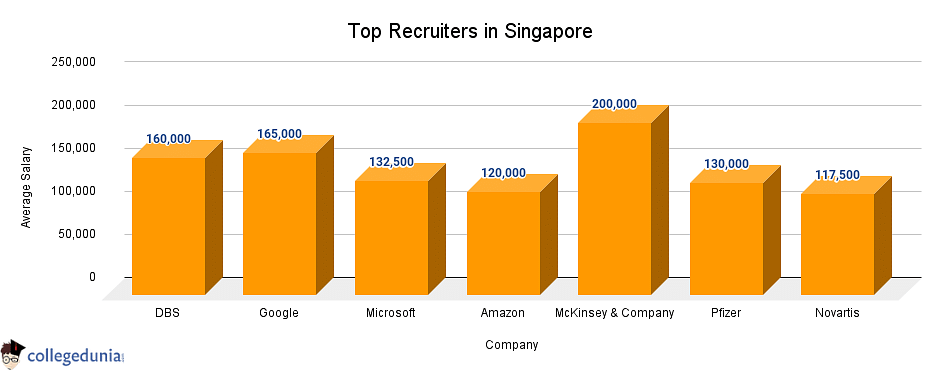
| Job Title | Average Annual Salary (SGD) | Average Annual Salary (INR) |
|---|---|---|
| Tax Director | 250,000 | 1.54 crore |
| Finance Director | 240,000 | 1.48 crore |
| Treasury Director / Treasurer | 200,000 | 1.23 crore |
| Financial Controller | 150,000 | 92 lakhs |
| Trade & Sales Support | 150,000 | 92 lakhs |
| KYC Operations | 130,000 | 80 lakhs |
| Client Services | 130,000 | 80 lakhs |
| Portfolio Risk & Analytics | 150,000 | 92 lakhs |
| Account Director (Regional / Global) | 250,000 | 1.54 crore |
| Country General Manager / Commercial Director | 190,000 | 1.17 crore |
| Supply Chain Manager | 140,000 | 86 lakhs |
Singapore has a thriving art and culture, is a food-lovers paradise, and an efficient business city. Raising the bar of Asian education and getting it recognized across the world, Singapore has stepped up the ladder of study-abroad destinations and is becoming a new home to Indian students.;
Singapore is also popular for its transfer programs where students are offered an opportunity to study abroad with institutions in Australia, UK, China, USA, etc. Apart from the education sector, Singapore is home to over 7,000 MNCs offering a huge employment market to fresh graduates from Singaporean Universities.;
FAQs
Ques: How much does it cost to study in Singapore?
Ans: The boosting economy of Singapore is accompanied by some of the highest tuition fees in Asia. Irrespective of the high cost of study in Asia, it is still one of the most in-demand study destinations. The cost of studying in Singapore for Indian students is given below:
| Level of Study | Annual Fees (SGD) | Annual Fees (INR) |
|---|---|---|
| UG | 35,000 | 21 lakhs |
| PG | 40,000 | 24 lakhs |
| BBA | 25,000 | 15 lakhs |
| MS | 50,000 | 30 lakhs |
| MBA | 70,000 | 43 lakhs |
| PhD in Singapore | 26,000 | 16 lakhs |
Ques: Is Singapore good for Indian students?
Ans: Yes, what attracts international students to Singapore is that the country has outpaced most other Asian countries in offering world-class education. It is also often recognized among one of the safest study destinations with low crime rates. Irrespective of the current economic downturn, Singapore has also managed to maintain a low unemployment rate of only 2%. It can be concluded that collectively these aspects along with various others make Singapore one of the most popular Asian countries for international students.
Ques: Is Singapore a cheap place to study?
Ans: The tuition fees, cost of living, and other additional costs related to studying abroad are relatively lower when your choice of study destination is Singapore. As compared to other popular study destinations like the USA, Canada, UK, Singapore Universities offers you world-class education at cheaper rates.;
- UG Degrees Cost: 30,000 SGD (18 lakhs INR)
- PG Degrees Cost: 40,000 SGD (24 lakhs INR)
Ques: Which course is best to study in Singapore?
Ans: Among some of the most popular courses opted while studying in Singaporean Universities and Polytechnics, certain courses are becoming more and more important. There is a growing need and demand for them among students from Singapore and other international students studying in Singapore. These courses are:
- Cybersecurity
- Media and Animation
- Hospitality and Tourism
- Sports Science and Medicine
- Business Analytics and Digital Economy
- Logistics and Supply Chain Management
- Advanced Manufacturing & Engineering
Ques: What are the disadvantages of studying in Singapore?
Ans: Studying in Singapore can be a fantastic experience, offering world-class education and exciting career prospects. However, it's important to be aware of the potential disadvantages before making a decision:
- Most universities in Singapore don't have large, traditional campuses with residential halls and vibrant student communities. This can be isolating for international students who are used to a more active campus life.
- Singapore is known for its strict laws and regulations, which can sometimes feel restrictive to foreigners. For example, there are heavy penalties for littering, chewing gum, and jaywalking.
- Singapore is a small island nation with a high population density. This can feel claustrophobic for students who are used to open spaces and rural environments.
- Singapore is a tropical country with hot and humid weather year-round. This can be uncomfortable for students who are not accustomed to such conditions.
Ques: How many Indians study in Singapore?
Ans: As of the latest information provided by the Ministry of External Affairs, Singapore hosts over 10,000 Indian students who are pursuing higher education in the country. The combination of academic excellence, diverse cultural experiences, and a welcoming environment makes Singapore a preferred choice for those seeking to further their education.
Ques: Is IELTS required to study in Singapore?
Ans: Yes, IELTS is widely accepted as an English proficiency exam for studying in Singapore. To secure admission to the top universities in Singapore. Candidates are typically required to achieve a minimum IELTS score of 6.5. This score is generally valid for two years for admission to Singapore universities. Beyond this period, universities in Singapore may not accept the score.
Ques: How many intakes are there in Singapore?
Ans: Public universities in Singapore generally offer two intakes for admission. The first intake, known as the Fall Intake, begins in August, while the second intake usually starts around February, referred to as the Winter Intake.
Private universities in Singapore often provide more flexibility with various intakes throughout the year. Students can typically expect intakes in the months of January, February, July, August, September, and October.
For accurate and up-to-date information on intake dates and Singapore admission deadlines, it is recommended to check the official website of the respective university you are interested in.
Top Universities In Singapore
Top College Collections For Singapore
Why to Study in Singapore?
The National University of Singapore (NUS) is ranked 8th in the world and the Nanyang Technological University, Singapore (NTU) is ranked 26th in the world by the QS World University Rankings 2024.



Explore Singapore Colleges Ranking
| University | |||
|---|---|---|---|
National University of Singapore - NUS | 17 | 8 | 20 |
Nanyang Technological University - NTU | 30 | 12 | 28 |
Meet our Counsellors


Hitesh
Senior Counsellor | 3+ Years Of Experience


Nupur Thapar
Senior Counsellor | 4+ Years Of Experience


Aadya Chadha
Senior Counsellor | 6+ Years Of Experience


Ayush
Senior Counsellor | 3+ Years Of Experience


Jashanpreet
Senior Counsellor | 4+ Years Of Experience


Tanuj
Senior Counsellor | 4+ Years Of Experience


Ditipriya
Senior Counsellor | 6+ Years Of Experience


Versha Sharma
Senior Counsellor | 3+ Years Of Experience
Discover Useful Documents and Template For Singapore Admission
Statement of
Purpose (SOP)
Letter of
Recommendation (LOR)
Student
Essay
Curriculum
Vitae (CV)
Interview
Applications
Popular Study in Singapore Videos
Popular For Scholarship
Exams For Singapore
Study in Singapore FAQs
Ques. What are the top 3 universities in Singapore?
The top 3 universities in Singapore as per the QS world university rankings 2023 are as follows:
| Top Universities | QS World University Rankings 2023 |
|---|---|
| National University of Singapore | 11 |
| Nanyang Technological University, Singapore | 19 |
| Singapore Management University | 561 |
According to Times Higher Education world university rankings 2023, the top universities of Singapore like the National University of Singapore and Nanyang Technological University are ranked among the top 50 universities in the world.
Ques. How much does it cost to study at a Singapore college?
The tuition fees for universities in Singapore are affected by the university you choose to attend, the programme you enrol in, as well as your nationality. The average tuition fees for international students in Singapore is around 22,500-43,320 SGD 913.79-26.55 lakhs INR). The estimated expenditure and cost of living in Singapore for an international student ranges from 1,164 SGD to 2,369 SGD (68,352 to 1,39,042 INR).
Ques. Is College in Singapore free?
Some of the universities in Singapore provide free education, but only for national and local students of Singapore. International students are required to pay the mentioned tuition fees as per the choice of program. However, they can apply for various scholarships in Canada for international students. These scholarships can provide full tuition fee waivers (Full Funding), or cover a portion of the tuition fees (Partial Funding)
Ques. Can I study in Singapore in English?
Yes, every undergraduate or postgraduate course will be taught in English since it is the official language of business and education in Singapore. The universities in Singapore demand English proficiency test scores such as IELTS or TOEFL to assess your proficiency in the language. If you are an international student, you need to fulfil the minimum English language requirements as per the respective university or program



























![International English Language Testing System [IELTS]](https://image-static.collegedunia.com//public/college_data/images/logos/ielts.png?h=52&w=52&mode=stretch)
![Test of English as a Foreign Language [TOEFL]](https://image-static.collegedunia.com//public/college_data/images/logos/Toefl Logo.jpg?h=52&w=52&mode=stretch)
![Duolingo English Test[DET]](https://image-static.collegedunia.com//public/college_data/images/logos/image (59).png?h=52&w=52&mode=stretch)
![Pearson Test of English [PTE]](https://image-static.collegedunia.com//public/college_data/images/logos/pte.png?h=52&w=52&mode=stretch)
![Graduate Record Examination [GRE]](https://image-static.collegedunia.com//public/college_data/images/logos/gre.png?h=52&w=52&mode=stretch)
![Graduate Management Admission Test [GMAT]](https://image-static.collegedunia.com//public/college_data/images/logos/gmat.png?h=52&w=52&mode=stretch)

